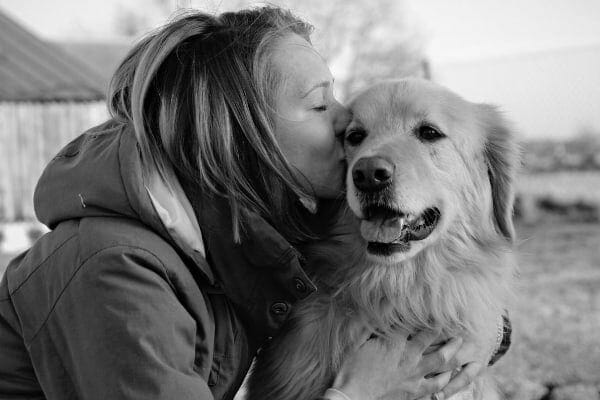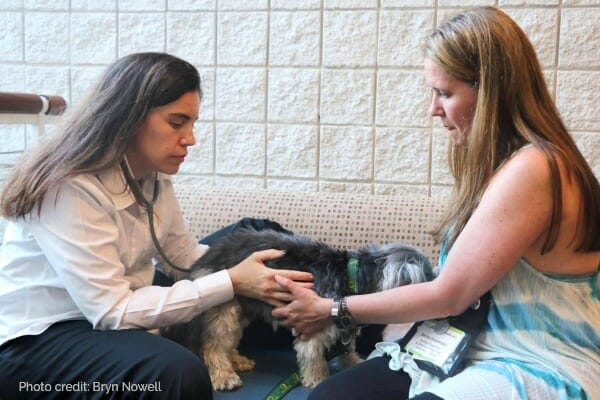
Do you advocate for your dog? Are you unwilling to accept the status quo when it comes to what’s best for your canine companion? Then this story will inspire you! Dr. Julie Buzby, integrative veterinarian and founder of Dr. Buzby’s ToeGrips®, shares an encouraging message about why your role as your dog’s voice may be the most critical role you play in your dog’s life…and the most interesting case of all.
Whether spoken by your own doctor or your dog’s veterinarian, no one wants to hear these five words…
“This is an interesting case.”
Always a bad sign. You don’t want your dog, child, or self to be an “interesting case.” Frankly, no one wants to be a “case.” But if you must be, you want to be a mundane, run-of-the-mill, bland one—the stuff textbooks are made of. As a veterinarian, I know this to be true. It’s good—really good—when I can tell a client, “Your dog clearly has X, Y, or Z. This treatment protocol is the gold standard. This condition is very common. I’m not worried, so please don’t you be. I promise to let you know when you need to worry.”
However, life doesn’t always play out that way.
An “interesting case” in my own family
Recently, I found myself sitting in a dentist’s exam room for an after-hours emergency. I was with my son, the “interesting case.” He had been seriously injured playing outside, and now I was drowning in mom guilt while the kind dentist assured me he didn’t mind staying after hours because my son was such an “interesting case.”
“We don’t get to see these very often,” he chirped.
My little 8-year-old son was holding up much better than I. It was clear that the repair was going to be temporary—both because this was an emergency situation and because he had years of growing to do. My brain latched onto a plan, and I remember saying repeatedly, “We need this repair to last 10 years!”
As the weeks marched by after the accident, I was still praying to get “10 years” out of that repair. It had become my mantra.
Months after the accident, it hit me why 10 years was so important to me—transfer of responsibility. While the doctors had rattled off their recommendations, options, and risks, I remember looking down into my son’s wide, trusting eyes and feeling choked up. I was making hard choices on his behalf—the consequences of which he’d live with for a lifetime.
But in 10 years, my son will be eighteen—a legal adult, able to vote in presidential elections and fight in war. He will be a man with a better understanding of his body and the risk-reward ratio.
At that time, he can listen to the doctor explain the options, potential complications, and estimated recovery times. He can decide for himself between treatment plan A, B, or C. Of course, I will always be happy to help him, but the decisions about his care will primarily fall to him.
Making choices for those in our care
For now, his healthcare decisions primarily fall to me. He is a little boy with little understanding of the big picture. He can barely remember to brush his teeth most days, let alone be concerned about a future dental implant.
This means I make the choices for him. I decide what is safest, wisest, and best for his health. I determine what doctor we go to, sign the release forms, and nurture him in his convalescence.
Isn’t the same true of our beloved dogs?

Our dogs trust us to protect their sweet souls
Like my son, our canine companions place full trust in us to care for them well, with no real vote in the decision making process. And, for better or for worse, they live with the consequences.
Can you relate to feeling overwhelmed or underprepared at some point in your role as advocate and caretaker for your dog? Have you ever succumbed to dog mom guilt about your dog’s care? (As an aside, if you’re grappling with guilt, please read my related story: 3 Life Lessons for Dog Moms.)
My son will grow up and find his voice. Our pets never do, unless we give them one.
Lingua barka: embracing your role as your beloved dog’s interpreter
Week after week, I spend time with clients who’ve developed their own lingua franca with their dogs. I call it their “lingua barka.” My husband says, “You are the only person I know who comes back from work [at the vet hospital] looking 100 times better than when you left!”
There are many reasons for this—my amazing patients, my kind coworkers, a job I love—but partnering with clients who are conscientious and proactive in being their dog’s human voice supercharges my batteries. My clients speak up for their dogs, embrace their role as their dogs’ biggest advocates, and have a common language—a lingua barka—with their canine companions.

I observe dog parents not only stepping up to the plate, but also swinging for the fences when it comes to advocating for their furry family members. Since you’ve read this far, I imagine you are a proactive dog parent too. I imagine that you have an insatiable appetite for learning every detail about caring for your dog, including how to continually improve your advocacy skills.
If so, here are three tips for honing your pet parent advocacy skills:
1. Be informed, be curious, and be proactive in your role as your dog’s healthcare advocate.
First, advocating for your canine companion means speaking up for what is in your dog’s best interest. The more proactive you are in your dog’s health care, the better your dog’s quality and quantity of life. This also means recognizing your role as a key member of your dog’s healthcare team. You and your veterinarian can work in partnership for the long-term health and well-being of your dog.
2. Establish daily health care routines at home for your dog’s ongoing preventive care.
Just as importantly as teaming with your vet, proactive pet parents are passionate about tackling at-home dog care routines. For example, many of my clients are eager to learn every aspect of their dog’s daily health from dog toothbrushing and clipping dog nails to helping a dog who’s afraid of hardwood floors. Establishing at-home preventive care measures sets your dog up for a lifetime of better health and wellness.
3. Embrace and celebrate your role as your dog’s voice.
If you find yourself unable to be passive about your dog’s care and unwilling to accept your dog’s status quo without doing everything in your power to help him or her, I give you a standing ovation!
As your dog’s biggest advocate, you play an active role in your dog’s wellbeing. You not only recognize that role, you embrace it. You are your dog’s human voice.

The most interesting case…
Finally, there is an “interesting case” in this story, but it’s not about my son. As a pet parent, being intentional, informed, curious, detailed, and persevering in the human voice you provide your dog directly impacts his or her quality of life, and by association, also your own!
This is the interesting case.
How do you advocate for your dog?
Please comment below. We can all learn from each other.


i agree, advocate for your dog, keep a journal, keep your dog stimulated, and keep , keep advocating, life can be busy and stressful and hard but that journal and that advocating must be prioitised, your best friend, your dog, needs you to help him/ her, you know your dog the best and you must help them get the help they need and stand up for your dog and what is the right help for your dog as other people will not know or understand your dog’ s paticular situation, you must state it clearly for them so they can get the right help, and do not accept the wrong help and keep that journal so you can best help and always help your dog in times of their need
Hi Cayley,
Thank you for sharing your thoughts and advice. Best wishes to you and yours!
Your post really resonated with me. You have also described a gold standard that all pet parents should be looking for in their choice of veterinary professionals. In the most recent era where dogs go to the vet “alone,” while you wait in the car outside, we have lost the opportunity for face to face communication with the vet. Your post made me resolute to insist that I am heard and that this interaction is not all about the vet.. It is about the dog., after all.
Thanks for your comment. I actually wrote this story before COVID, and didn’t even think about how COVID has drastically changed vet med and the client/patient experience. You bring up a great great point. I know vets and their staffs are doing their absolute best right now and our profession has been slammed. But you are absolutely right…now more than ever it’s so important to have a relationship with a veterinarian whom you trust, and all parties have to work extra hard to ensure clear 2-way communication.